- Home
- John W. Mefford
GREED Box Set (Books 1-4) Page 2
GREED Box Set (Books 1-4) Read online
Page 2
Chapter Five
Needing to feel a bit of the Christmas spirit, or possibly just desperate to escape the unfolding drama at work, I wrapped an original Marisa-created, red-and-green-striped scarf around my neck and checked out the store windows around the historic downtown Franklin square. I strolled past meaningful displays and shameless advertisements, making my mental Christmas list and trying to keep the work stuff out of my head.
Halfway down the second block, I heard a repetitive jingle at the opening into the jewelry store and saw golden autumn leaves swirling in front, as if their choreography invited customers to enter the high-end merchant. I gazed through the window and saw an amazing presentation of diamond bracelets and engagement rings, all set in platinum. One day, I would have to crack open my piggy bank and shock Marisa with some major bling.
I ignored an instant tightening in my chest, and noticed a few of the leaves skipping into the store, as if part of the dance. Over by the far counter, a little boy wearing an aviator hat that covered his ears, twirled around his mom, Karina, our neighbor. I guessed Ricky was about three or four years old now, at least a couple of years younger than his brother, Brent. But it was Ricky’s fireplug shape and plump cheeks that most resembled my colleague and friend, Reinaldo.
I was reminded of Reinaldo’s withdrawn, unapproachable demeanor at the merger announcement the other day, and he had been nearly mute since then. Most of the time, you couldn’t get Reinaldo to stop talking, usually about his beloved Brazil national soccer team. In fact, when it was announced that Rio de Janeiro would host the FIFA World Cup, he literally broke down and cried. He certainly had that Latin emotion churning inside him—it was obvious.
I took a step toward the door, but paused and eyed Karina’s body language. She studied and pointed at several items in the showcase, but her expression wasn’t entirely festive. Her face appeared tense, and she hardly noticed little Ricky darting around. She scrunched up her wavy, brown hair behind her head as she looked in the mirror, holding a dangling earring.
I got so close to the window my nose touched. I could have sworn those were diamonds, the size of ping-pong balls no less. Unless they were fake.
Not likely at this retailer.
Karina’s recent promotion to editor withstanding, she’d always worn JCPenney, never Neiman Marcus. And her jewelry collection, from what I’d seen, consisted of simple stud earrings.
I recalled earlier that morning spotting a For Sale sign in the Silva’s yard. Either Karina’s paycheck had doubled and they were “moving on up,” or a nasty rumor that I’d caught wind of had an element of truth—the Silvas were splitting up. They’d been friends with me and Marisa for years, and I couldn’t imagine having to choose sides. They were good people, and even better as a couple.
Karina appeared stressed, possibly edgy. I’d seen warning signs like that from girls over the years, and I’d learned avoidance was the most appropriate response. At least for me.
***
“Ma’am, we’ve looked through almost every variety of earrings.” The sixty-something salesman enunciated every syllable with exaggerated care.
“I’m not good at making these types of decisions,” Karina said, moving her eyes back and forth. “The ones on the left are nice. I’ll go with that pair.”
The well-coiffed salesman lowered his specs. “Would you like for me to wrap it for you?”
“Yes, thank you. But I need it fast. I have an important appointment I need to make.” She felt a tug on her coat.
“Mommy, we go now?” Ricky’s eyes were half shut. He’d missed his afternoon nap, and Karina knew he’d either conk out on the jeweler’s floor or throw a hissy fit if she didn’t get him home quickly.
“Ricky, we’re almost done. Want a candy cane?”
His eyes popped open with anticipation, and she dug in the bottomless pit known as her purse.
“Here you go!” She unveiled the bribe.
Ricky grabbed the red and white sugar stick, and within seconds, his face and hands were coated with a sheen of stickiness.
Karina turned back to the counter as the salesperson tied the last red bow. He slid the bill across the counter.
She paused momentarily, then set down her plastic, hoping the card wouldn’t be rejected. She knew she couldn’t afford the jewelry, but she’d convinced herself Tiffany was worth it. She fantasized how Tiffany would reciprocate with her expression of love.
Chapter Six
Claps of thunder rattled the window frames in our rented home, jarring me awake. Marisa still slept peacefully, her hands folded across her flat belly, a crescent of skin exposed just above her black panties. She could sleep through just about anything.
The lightning and thunder ignited a spark in my brain. I replayed the life-changing announcement at work, William, the airbag, and the PHC leader, Turug Patel, practically speaking in tongues, sugar-coating the fact they’d get rich and fat off this deal while the rest of us would be downgraded to a simple number, what they called an FTE (full-time equivalent) in the business. Any of us could be dismissed, all in the name of profit. I drifted in and out of sleep, struggling to keep my runaway mental engine in check.
Uncontrollable laughter splintered the quiet. The alarm was tuned to The Ticket, a sports radio station where the morning crew was engaged in a funny bit. I punched the clock silent. Darkness still blanketed our bedroom. Marisa had early meetings at the bank, but I jumped out of bed first, my brain already in overdrive. Intent to learn more about the J&W purchase, and the resulting impact, I debated which colleague I’d talk to first—possibly the son of the airbag himself, Harrison.
The skies hovered just above the treetops, thick with clouds. Rain came down in rhythmic sheets with no end in sight. Temperatures were expected to reach no higher than the mid-thirties, thankfully with no chance of sleet or ice, according to the Barbie-like weather person last night.
Not a big fan of hats, I reached the back door of the sixty-year-old brick office building with my head drenched, chilling my entire body. Predictably, the back of J&W had flooded and box fans were out in full force, creating a buzz as loud as a small prop airplane. Mrs. Ireland, our affable yet clueless receptionist, must live up here, I thought. If nothing else, she’s dedicated. I weaved around the squadron of dusty propellers and seven drying umbrellas, but she caught me before I could remove my coat and escape behind my office door.
“Oh, Michael, thank goodness you’re here. The super won’t answer his cell phone, and the rain is leaking into the server room. I’m worried it’s going to get worse.” Her pace quickened with every word, and I stared at her mouth to make certain I understood what was creating such a panic.
She filled me in. A couple of early-arriving system administrators were taking care of the machines, moving them away from the outside wall, laying down towels to soak up the rain water, and ensuring the servers were operating at normal capacity.
“Michael, you’re such the handyman. Could you go outside to see if you can find the origin of the leak?”
I took a deep breath. Before the PHC acquisition pep rally, I wouldn’t have hesitated. Now, I actually thought about how I could avoid the cold-ass rain waiting for me outside. I looked down. Seeing my apprehension, Mrs. Ireland offered me her pink rain hat. My pride wasn’t going to get in the way of this bone-chilling event. I pulled the ill-fitting, floppy hat tightly over my head as I stepped out the back door and turned left toward the adjoining alley, not sure what she expected me to find.
I estimated the wall in the server room to be about halfway down the exterior wall. Two steps around the corner, I paused. Worn, red-brick walls bordered both sides of the dreary passage. I felt engulfed by the elements, as if the morose alley was sucking me inward like a black hole. The torrential rain blurred the opposite end of the alley, which I knew was only about fifty yards away.
I stepped carefully, but the surface was a minefield of potholes. I stumbled into one and soaked my right leather sho
e. Shit!
Mud oozed into the middle of the alley, and bottles, pieces of rooftop, and a few scraps of metal were scattered along my path. Good God, it smelled putrid! I looked up again. The server room must be on the other side of the dumpster. Bags of spilled trash littered the area around the bin. One bag sagged over the container’s front lip, dangling about a foot over my head.
With my khaki pants, shoes, and socks already soaked, I took a few steps away from the wall and got a face full of unrelenting rain. Peering toward the rooftop, I squinted. It appeared the gutter had been pulled away from the building two to three feet. I bet water was gathering at the bottom of the building just under the break in the gutter. I’d have to walk to the other side of the dumpster to verify where the water was entering the server room.
Broken glass crunched under my shoes, and the foul odor grew worse. With only three feet of space between the fatigue-green trash container and the building, I shuffled sideways while I looked up to locate the exact spot of the gutter issue.
I tripped—fell flat on my hands and face—covered in mud and all sorts of muck. What the hell did I trip over? And the godforsaken smell!
Huddled low to the ground, I retraced my steps, using my hands to feel in front of me. Something blended in with the dark, rain-soaked rocks and asphalt. A plastic garbage bag. I nudged it with my foot. The bag was heavy enough to trip me, yet it was pliable.
I grabbed it with both hands and used my weight to help drag the bulky bag away from the dumpster. The plastic tore open. I lost my leverage and fell back on my butt. Something slid out. I jerked forward, ensuring my eyes weren’t failing me. A human arm.
I stumbled to my feet then slipped down again, still staring at the plastic bag—and the arm—as if it could reach out and pull me back. I turned and raced to the back door, nearly tripping over bottles and other trash in the alley. My heart pounded as I skidded to a stop, fumbling through the security code.
I shouted as soon as I opened the back door, “Call 9-1-1.” My mind wasn’t aware of my surroundings, and I careened off the swarm of fans and umbrellas. The last thing I recalled was shooting pain from the thump of my head hitting the concrete floor.
“Michael, are you okay?” Lights blocked out specific images, but I slowly opened my eyes, sensing people standing around me. Paula and Mrs. Ireland were huddled next to me.
“You must have hit your head when you fell.” Paula put one hand on my shoulder. “Are you okay? Can you talk? Do you remember what you said when you ran in the building?” She helped me sit up.
Blood rushed to my throbbing head, and I became dizzy. I closed my eyes and saw flashes of images.
“I was back by the dumpster…tripped over a bag. A human arm just, just slid out and was laying there…unattached.” Gasps rippled through the throng of onlookers. “I ran inside and yelled for someone to call 911.”
I opened one eye and spotted Paula. Wrinkles between her brows showed her concern. “Mrs. Ireland, call an ambulance for Michael. Then call the police. Everyone else, stay calm but do not leave this building. It’s too late for whoever he found.”
I lay back down, draping my arms over my head, shaken to the core.
Chapter Seven
A whaling siren pierced my consciousness—police, ambulance, fire, I wasn’t sure. For a second, I thought it had all been a dream. I opened my eyes and saw only shades of gray in motion.
I heard repeated chirps and realized I was being wheeled to an ambulance. I felt a stiff, starched sheet under my fingertips. Two straps kept my body stable, and my neck was stuck in a restraint. I blinked my eyes and began to feel more lucid after my brief nap. A couple of drops landed on my forehead, reminding me of the deluge earlier.
The grotesque image wouldn’t stop flashing in my pounding head…the arm coming to life, a hand reaching out for me.
A rapid, but familiar click of heels hit the pavement…Marisa’s heels. Paula must have called her, thank God. Barking voices, car doors shutting, and rhythmic beeping dampened Marisa’s conversation with the medical personnel.
“Showing obvious signs of a concussion, but more tests need to be run once he’s at the hospital,” the paramedic said.
Marisa appeared at my side. She tenderly stroked my face, her deep, honey eyes moist. She hopped in beside me after they dumped me in the back, like a conveyor belt dropping a piece of luggage into the belly of a plane.
“Careful,” she said to the paramedics.
“Do they know who it is?” My voice was shaky. I reached for her hand.
“Baby, I haven’t heard anything. The police are here. We’ll let them worry about that. I want to focus on making sure you’re okay.” Marisa wiped a single tear from her cheek. I hated seeing her cry, but her concern for me melted more of my icy exterior.
Marisa said the paramedics appeared to be filling out paper work before shutting the doors. I attempted to wiggle my head in the restraint, and my arms pressed against the restrictive nylon straps. My increased lucidity only led to more frustration from feeling like a crazy person being carted away to the funny farm. Was this the true feeling of claustrophobia? I released a slow, purposeful breath and counted to ten.
My eyes shifted left and right. I noticed oxygen equipment, a defibrillator and monitor, bags of bandages, yellow flashlights, blankets, and a stethoscope. Then I picked up a conversation between what sounded like a couple of cops.
“Hey man, this is a real crazy one. This girl was killed and thrown in with the trash. Actually, she missed the dumpster. It’s not a pretty sight. Get ready to gag.” He coughed.
“I better alert the wife. My nightmares will probably flare back up.”
Questions darted through my fuzzy mind. None of them connected.
Outside the ambulance, a bank of lights popped on, not flashing like from a police vehicle, but more constant light. Marisa told me two TV reporters had walked by the ambulance holding microphones and babbled something to their respective cameramen. They stopped at the yellow police tape in the front end of the alley and pointed their camera operators toward the movement around the dumpster. Meanwhile, other reporters had arrived from the print press, including one we both knew.
Stu Owens was a veteran reporter working the city government beat for the Times Herald, Karina’s paper. Marisa and I had met him at a New Year’s Eve party a couple of years back at Reinaldo and Karina’s house. Violent crimes weren’t common in our growing town, but if one occurred, Stu’s byline was on the story. A bit unkempt, Stu poked his head into the ambulance and politely asked Marisa if he could get a quote from me.
“Stu, can you wait until tomorrow for this?” She sounded perturbed that he had the nerve to invade the ambulance’s safe zone.
“Marisa, it’s okay. I can talk a bit,” I said, eager to focus on something other than my involuntary confinement.
“Hey, Michael. I know you’re not feeling well, so any little quote would work for this first story,” Stu said with his pen already touching paper.
“Do you know who was in the bag?” I asked Stu my question before I provided his quote.
“No, nothing. The police are being tight-lipped.”
I took a careful, deep breath not wanting to increase my brain pain.
“I went outside to try to find a leak into our building. I found a plastic bag, a human arm slid out. My heart almost jumped out of my chest. I didn’t know whether to cry or throw up. I just ran to get help.”
“Great. Thanks, Michael. I’ll give you a call in a day or two to ask you a few more questions.” Stu turned and darted off.
The ambulance driver finally shut the door, drowning out most of the commotion. I closed my eyes. I’d have just as many questions for Stu as he would for me.
Chapter Eight
The hospital staff concluded I’d suffered a mild concussion, nothing more, and they kept me awake for most of the night. “No tackle football for you for at least two weeks,” said the plump nurse who entered my room befor
e daybreak. The nurse’s attempt at humor would have been warmly received had I not been exhausted. The last twenty-four hours I’d been poked and prodded, but most of my time was spent waiting for orders to be signed, medicine to be administered, and doctors to show up.
The nurse then pretended I was a child and chose to address Marisa. “The on-call doctor will drop by in an hour or so to sign off on the test results and release papers.” The nurse leaned over to grab an ice cup, but her beefy midsection yanked every wire and tube attached to me. Shit, get this beast off me before she rips the IV out of my arm!
I grunted, irritable from lack of sleep. They’re probably making me pay for the oxygen in the room while I wait for the damn doctor. My God, just get me out of here and let me go home with my Marisa. I rolled onto my side, dragging all of my artificial appendages with me. Marisa smiled but didn’t say a word, knowing I’d hit my frustration ceiling.
A couple of hours later a volunteer wheeled me out of the hospital, and one of the nurses handed me the latest copy of the Times Herald. The headline said it all: Dead Body Found in Alley. Then, on the subheader just below it, I recognized the quote: First Person on Scene—“I didn’t know whether to cry or throw up.”
I read the details of Stu’s story on the way home. Still no identification of the body, not even a confirmation it was female. It appeared very little information was circulating on the crime, which meant I knew something the press, including Stu, did not.
As Marisa drove into our neighborhood, I began to think—I went into the office yesterday wanting to find out more information about the merger, or rather, acquisition, of my company. I had hoped to speak with Harrison, a member of the family who owned J&W. Now, I’d stumbled into a completely different nightmare, one that could live with me far longer than work regime changes and layoffs. I wondered if this gruesome crime would lead to PHC rethinking their acquisition of J&W. Probably not, but a man could dream.

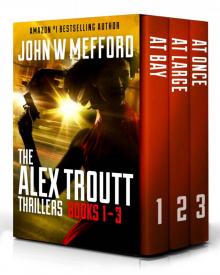 The Alex Troutt Thrillers: Books 1-3 (Alex Troutt Thrillers Box Set)
The Alex Troutt Thrillers: Books 1-3 (Alex Troutt Thrillers Box Set)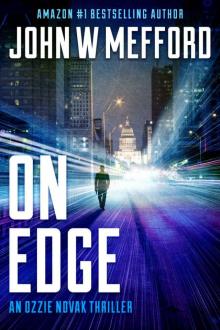 ON Edge
ON Edge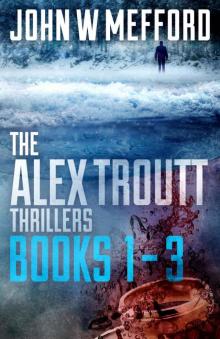 The Alex Troutt Thrillers: Books 1-3 (Redemption Thriller Series Box Set)
The Alex Troutt Thrillers: Books 1-3 (Redemption Thriller Series Box Set)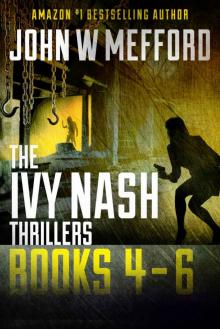 The Ivy Nash Thrillers: Books 4-6: Redemption Thriller Series 10-12 (Redemption Thriller Series Box Set)
The Ivy Nash Thrillers: Books 4-6: Redemption Thriller Series 10-12 (Redemption Thriller Series Box Set)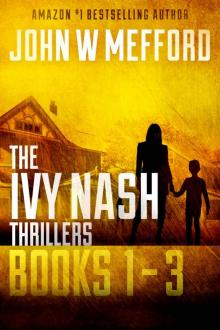 The Ivy Nash Thrillers: Books 1-3: Redemption Thriller Series 7-9 (Redemption Thriller Series Box Set)
The Ivy Nash Thrillers: Books 1-3: Redemption Thriller Series 7-9 (Redemption Thriller Series Box Set)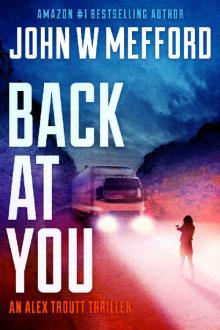 Back AT You
Back AT You BOOKER Box Set #2 (A Private Investigator Thriller Series of Crime and Suspense): Volumes 4-6
BOOKER Box Set #2 (A Private Investigator Thriller Series of Crime and Suspense): Volumes 4-6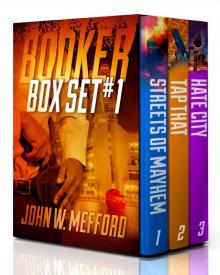 BOOKER Box Set #1 (Books 1-3: A Private Investigator Thriller Series of Crime and Suspense)
BOOKER Box Set #1 (Books 1-3: A Private Investigator Thriller Series of Crime and Suspense)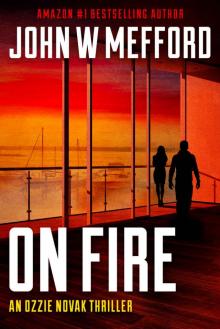 ON Fire (An Ozzie Novak Thriller, Book 5) (Redemption Thriller Series 17)
ON Fire (An Ozzie Novak Thriller, Book 5) (Redemption Thriller Series 17)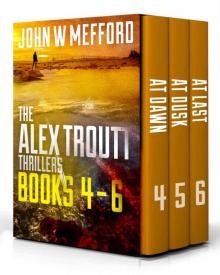 The Alex Troutt Thrillers: Books 4-6 (Redemption Thriller Series Box Set Book 2)
The Alex Troutt Thrillers: Books 4-6 (Redemption Thriller Series Box Set Book 2)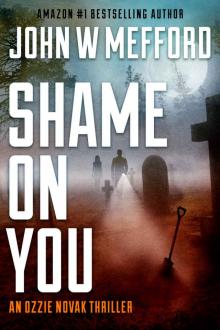 Shame ON You
Shame ON You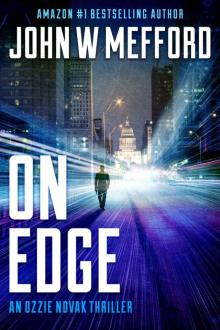 ON Edge (An Ozzie Novak Thriller, Book 1) (Redemption Thriller Series 13)
ON Edge (An Ozzie Novak Thriller, Book 1) (Redemption Thriller Series 13)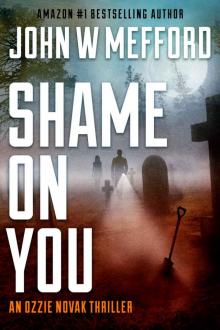 Shame ON You (An Ozzie Novak Thriller, Book 4) (Redemption Thriller Series 16)
Shame ON You (An Ozzie Novak Thriller, Book 4) (Redemption Thriller Series 16)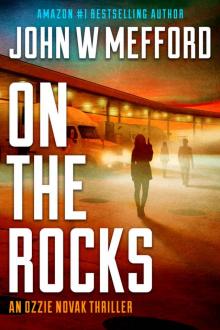 ON The Rocks (An Ozzie Novak Thriller, Book 3) (Redemption Thriller Series 15)
ON The Rocks (An Ozzie Novak Thriller, Book 3) (Redemption Thriller Series 15) GREED Box Set (Books 1-4)
GREED Box Set (Books 1-4)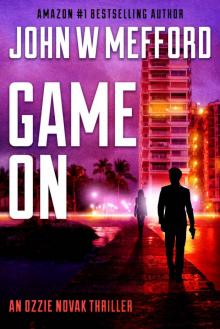 Game ON (An Ozzie Novak Thriller, Book 2) (Redemption Thriller Series 14)
Game ON (An Ozzie Novak Thriller, Book 2) (Redemption Thriller Series 14)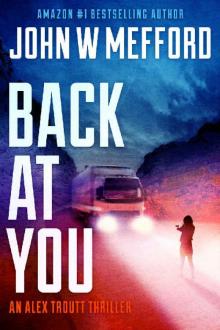 Back AT You_An Alex Troutt Thriller
Back AT You_An Alex Troutt Thriller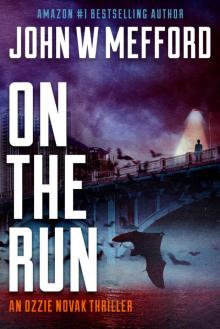 ON The Run (An Ozzie Novak Thriller, Book 6) (Redemption Thriller Series 18)
ON The Run (An Ozzie Novak Thriller, Book 6) (Redemption Thriller Series 18)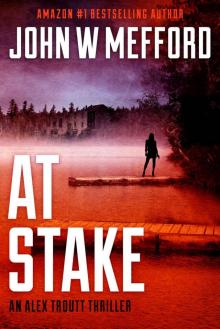 AT Stake (An Alex Troutt Thriller, Book 7) (Redemption Thriller Series 19)
AT Stake (An Alex Troutt Thriller, Book 7) (Redemption Thriller Series 19)